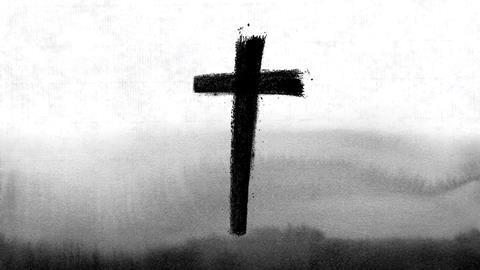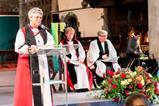A theology of Holy Saturday is for all those who cannot see the way ahead – who suffer, fail or doubt. Between Good Friday and Easter Sunday is where true spiritual growth happens, says Bishop Emma Ineson
I can vividly recall the time when I appeared before a selection panel to discern whether God was calling me to ordination in the Church of England. I was 25 at the time and mother to a small baby. In order to assess my fitness for ordained ministry, I attended several interviews. It was exhausting and, through the fog of my baby brain, I’m surprised I could even remember my name.
Among the panoply of group exercises (terrifying) and psychometric tests (is that ink blot supposed to be a butterfly or a rabbit?), I remember one particular question: “In what sense, if any, do you recognise the failure of God?” The interviewer knew from my paperwork that I had a fairly conservative background.
I suspect he was trying to test me and, possibly, catch me out. Was my view of God all roses and sunflowers? Did I have room in my shiny theology for a suffering saviour? I can’t recall exactly what I said, but I do remember my bumbling response was about the cross, and that on the cross maybe Jesus thought he had failed. And Jesus was God. So maybe God did fail. A little bit. For a while. So perhaps that means he knows what we feel like when we fail. As we all do. Is that OK, and please can I be a vicar?
The cross
Since that day, I have thought much more about the concept of failure, particularly in the light of the challenges we’ve faced during and since the Covid-19 pandemic. In the cross we are given the greatest example of hope over defeat, victory after failure. I’ve come to realise that it is through the cross we can view all our own struggles and challenges.
I am in no doubt that, at the time, the cross felt like failure to Jesus and his disciples. That is why Jesus cried out: “My God, my God, why have you forsaken me?” (Matthew 27:46). The death of Christ involved physical suffering but, more than that, it involved spiritual suffering; desolation, separation from the Father, forsakenness. As John Calvin put it: “not only was the body of Christ given up as the price of redemption but…there was a greater and more excellent price – that he bore in his soul the tortures of condemned and ruined man.”
Much of life seems to be lived in the gaps between pain and hope
Jesus’ followers, knowing their beloved teacher lay dead in a tomb, also keenly felt this sense of forsakenness. For them, the cross was failure. The end.
We know, of course, that Jesus’ death was not the final chapter and that what happened three days later would change the course of history forever. But what took place in that ‘failure space’ between the cross and the resurrection – the day between Good Friday and Easter Sunday – is equally significant for Christians.
Holy Saturday
I like the little story that goes like this: “What do you think Jesus did on Holy Saturday?” asked the priest. “Well,” said the child, “I think he went and searched the coldest, darkest corners of hell, looking for his friend Judas.” It’s a comforting idea – that Christ descended to hell to bring light and release to the bleakest places, such that there was nowhere untouched by the victory of the cross. Whenever we say the Apostles’ Creed, we state the Christian tradition that Jesus “descended into hell” to release the captives.
When Jesus foretold his own death and resurrection, he often used the description ‘three days’ to describe the length of time that he would be in the tomb: “From that time on Jesus began to explain to his disciples that he must go to Jerusalem and suffer many things at the hands of the elders, the chief priests and the teachers of the law, and that he must be killed and on the third day be raised to life” (Matthew 16:21).
At this point, the disciples did not comprehend what he was speaking about, of course, but ‘three days’ would have had great significance for them. For Jewish people, it was symbolic of waiting – not today or even tomorrow, but the day after that: three days.
Holy Saturday is that experience of ‘dead time’ – of waiting for something to happen and not knowing whether or not it will. It is the disciples huddled in the upper room, anticipating their next move, without the knowledge that there will be a resurrection: “They still did not understand from scripture that Jesus had to rise from the dead” (John 20:9).
It is the disciples’ sense of incomprehension that speaks most clearly into our own experience of failure – or the fear of it at least. It is the young person waiting for exam grades, or someone anxiously anticipating medical results. It was the experience of many during the darkest days of the Covid-19 pandemic, knowing something awful was happening, but not really what it was or how or when it would end. It is the pause that we don’t yet know is a pause. There is sadness in that place, uncertainty and the reality of failure; yet, in that place, God remains.
RS Thomas has been called a poet of Holy Saturday. Many of Thomas’ poems use images of silence, doubt and uncertainty, as opposed to knowledge, faith and confidence. His poem ‘Kneeling’ expresses his frustration with ready certainties. It speaks of the importance of the pause:
Prompt me, God;
But not yet. When I speak,
Though it be you who speak
Through me, something is lost.
The meaning is in the waiting.
Failure
A theology of Holy Saturday is a theology for all who suffer, fail or doubt – or who simply cannot see the way ahead. Failure is part of all of our lives. It happens in small and large ways. Every. Single. Day. The teabag left in the cup too long; the bus missed; the probation extended; the exam failed; the family left unhoused because of an administrative error; the patient who died due to a misdiagnosed illness; the monuments erected to those who made great wealth on the backs of enslaved people; the country invaded by a neighbouring leader paranoid about a regional power imbalance.
Failure is not something that we get over. It is not a temporary inconvenience on the road to great success. It isn’t something we can sidestep or dodge, no matter how victorious the resurrection ultimately is. Failure is common to us all. Like Holy Saturday, we must learn to live with and dwell in it. We need this in-between day. It is the most accurate expression of our current human experience, living constantly in the in-between; the now-and-not-yet of the coming kingdom, where great success is promised, but has definitely not yet arrived.
Dwelling in Holy Saturday is the most honest place we could be
We are living in Holy Saturday times. We do not know what the future holds in the Covid aftermath; in the cost of living crisis; in the war in Ukraine and its effect on the lives of the Ukrainian people; in the impact of environmental breakdown or division in the Church over questions of sexuality. These are uncomfortable times, but even when we don’t particularly want to, sometimes we need to stay in Holy Saturday.
Holy Saturday shows us that, even while we are living in the grief and pain of failure, God is still at work, redeeming everything. He does this even when we can’t see what he is doing or how it will end. Much of life seems to be lived in the gaps between pain and hope. Dwelling here is the most honest place we could be.
The road to victory
So what might it mean for the Church to embrace failure? How might Holy Saturday help us make sense of these times, which defy sense-making? How can waiting in this place of unanswered questions draw us closer to God?
First, we are to acknowledge our own limitations, and give up on self-sufficiency in favour of reliance on God alone. We cannot rely on our own ingenuity, cleverness or strength because, at present, we have very little of any of those things. Sometimes all we can do is kneel before God and wait.
Second, Holy Saturday is a day of temporality. It is a day of incompleteness, requiring us to have flexibility in all our planning and scheming. We hold our plans lightly, and trust in God to bring them to fruition in his way and his time.
Sometimes all we can do is kneel before God and wait
Third, we make space for failure. When it happens, we don’t linger in Good Friday, demanding to know whose fault it is – or rush ahead to Easter Sunday, quickly trying to cover it up and forget it ever happened. Rather, we sit with the disciples on Holy Saturday, in the place of wondering and trying to make sense of it all.
The disciples on the road to Emmaus were living in the in-between, wondering what had happened and how it would all turn out. Jesus patiently, slowly, carefully walked with them as they attempted a postmortem of recent events. He helped them to discover the truth so that they could move on (or, in their case, go back to Jerusalem); he let them pour out their honest feelings before gently leading them to greater understanding.
They didn’t know it was him. But he was there. They didn’t know what was coming in the future. They definitely hadn’t got it all sorted. It was only over dinner that night, as Jesus broke bread, that their eyes were opened: “Did not our hearts burn within us while he talked with us on the way and while he opened to us the Scriptures?” (Luke 24:32).
On the cross – as Jesus overcame sin, death and hell – all the failure that exists in our world and in our hearts was brought to an end. The cross seemed like failure but, actually, it was the most rip-roaring success. It paved the way to the dawning of the brightest day as Jesus was raised to life. In the light of this, we see all our failures ransomed, healed, restored, forgiven.





































No comments yet